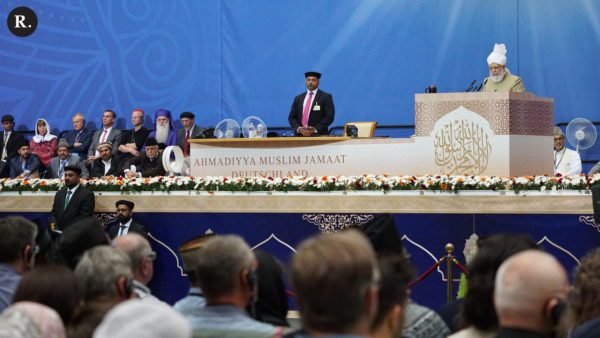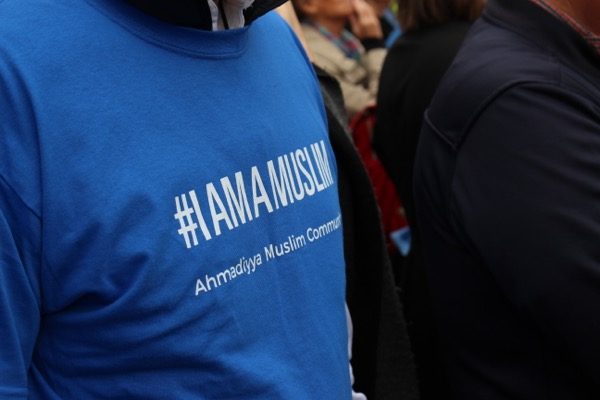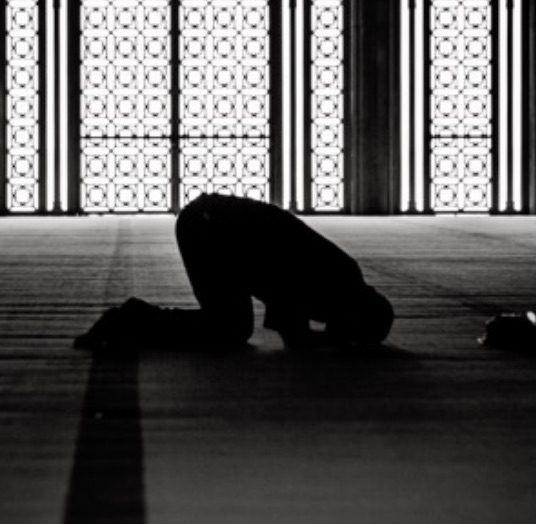“Violence is violence. It has no place in Islamic teaching, and no justification can be provided to it.”1
Readers of The Review of Religions are accustomed to the above words in the pages of this magazine published by the Ahmadiyya Muslim community whose motto is ‘Love for all, hatred for none’. The author of the above words however, is Muhammad Tahir ul-Qadri, founder of the Minhaj-ul-Quran.
In March this year Tahir ul-Qadri issued a fatwa, or religious edict, declaring that suicide bombers are destined for hell. His 600-page fatwa has been described as “arguably the most comprehensive theological refutation of Islamist terrorism to date,” according to the Quilliam Foundation, a London organisation that describes itself as a counter-terrorism think tank.
Tahir ul Qadri has set up an “anti-terror camp”: “Al-Hidayah,” (meaning the guidance) an Islamic retreat at the University of Warwick, in the UK, billed as a summer camp for Islamic learning, especially for the younger generation. This year the focus is exclusively on fighting extremism.
All attempts by Muslims to condemn violence are to be applauded and Tahir ul-Qadri’s fatwa condemns the indiscriminate killing of civilians. Writing in the only English online translation of the fatwa (60 pages as opposed to 600) Tahir ul-Qadri says of terrorists:
‘These people justify their actions of human destruction and mass killing of innocent people in the name of Jihad (holy struggle against evil) and thus distort, twist and confuse the entire Islamic concept of Jihad.’2
Interestingly, a search of the English ‘Introduction to the fatwa’ reveals the word ‘jihad’ which came up thirteen times, three times on the same page. No definition is presented in the English introduction as to what jihad is.
Alexander Meleagrou-Hitchens & Houriya Ahmed applaud the fatwa writing:
‘Dr Qadri’s ruling also goes further than most previous edicts by describing terror acts as so morally unjustifiable that they represent acts of “kufr” (disbelief). Most previous rulings only go as far as calling terrorism “haraam” (forbidden). Kufr acts are so serious that those committing them essentially forfeit their right to call themselves Muslims.’3
Speaking to CNN Dr Qadri said:
“The reality is that [Muslims] were waiting for a long, long time to get this kind of voice,”
“Their hearts had become desert and their spirits and their souls were thirsty. And unfortunately, the peaceful people are always silent. They don’t create news.”
Commentators have pointed out that the issuing of fatwa’s against terrorism is not new. In 2008, 6000 Indian Muslim clerics endorsed an anti-terror fatwa. Qadri himself was among the 170 Islamic scholars from various sects who signed an anti-terrorist fatwa in Amman in 2005.4
But none of these fatwas has stopped terror. The Amman fatwa was delivered a day before four British suicide bombers killed 52 people on London transport.
Terrorism perpetrated by the so called Muslims is not a new phenomenon. The Ahmadiyya Muslim community’s founder wrote about jihad over a hundred years ago and said that in accordance with the prophecy of the Holy Prophet of Islam(saw), he had come to totally ban wars in the name of religion. The Promised Messiah(as) also presented cogent arguments about the true nature of jihad.
Explaining the true concept of jihad, Hadhrat Khalifatul Masih IV(ru) writes:
‘So the greatest Jihad of every Muslim is to strive for the victory of Islam with whatever lies in his capacity by way of the Qur’anic teachings or by way of an example, beautiful example, set before the people by acting upon the Qur’anic teaching.
…the second Jihad mentioned in the Holy Qur’an and also in Hadith is Jihad against your own evil dispositions, evil inclinations etc. and to continue to wage a war against your bad-self which would continue to drag you to all that is satanic and that is the Jihad between light and darkness.
[The third from of jihad] is to protect the right of worship.’ (Q&A Sesssion with Hadhrat Mirza Tahir Ahmad(ru), Khalifatul Masih IV, Fourth Successor to the Promised Messiah(as) held on 5th November 1995 in London).
The Promised Messiah(as), over one hundred years ago, presented the following solution to address terrorism:
‘One solution that I can think of to this problem is that His Majesty, the Amir of Kabul, whose influence over Afghan tribes probably exceeds that of all previous Amirs, should gather the great scholars of religion and convene a discussion on the true nature of Jihad. These religious scholars can then educate the public about its errors. In fact, the religious scholars of this country should compile a few pamphlets in Pashto and make them available to the general public. I believe that this type of activity will have a tremendous influence on people. The passions instilled by the ignorant maulawis will gradually subside’ (The British Government and Jihad)
The Promised Messiah(as) also wrote about the danger of the issuing of fatwas on jihad by religious scholars:
‘The government that ignores such fatwas from these mullahs ultimately creates problems for itself because these days the maulawis readily label people as disbelievers over minor religious differences, applying to them all other fatwas that they apply to disbelievers.’
Referring to the events of his time in Afghanistan, the Promised Messiah(as) explains:
‘A group that has the power to declare a person to be a believer or disbeliever is dangerous, and the Amir should not be complacent with respect to them. They are the source of the rebellions confronted by every government. They have power over the common people and create havoc by turning them in whatever direction they please. It is therefore no sin to free people from their influence through gentle education about the true nature of Jihad.’ (The British Government and Jihad)
Since the time of the Promised Messiah(as) the Ahmadiyya community has worked ceaselessly to explain the true nature of jihad and to condemn terrorist activities.
Hadhrat Khalifatul Masih II(ra) writes:
‘On the one hand, the Promised Messiah(as) proved that the idea of compulsion in religious matters is not only alien but runs counter to the spirit and teachings of Islam and that it has been strongly and clearly denounced, and on the other, he declared that God had ordained that Islam should overshadow all other religions a second time and that the mission for which he had been sent was the regeneration of Islam and the deliverance of humanity from sin and iniquity through its wide portals. He called upon the world to take note of the fact that he had no armed forces at his command and that Islam would make rapid progress all the same, thus establishing the fact that the truth of its teachings did not stand in need of a sword for its propagation.’ (From address delivered by Hadhrat Mirza Bashir-Ud-Din Mahmud Ahmad(ra), Khalifatul Masih II, Second Head of the Ahmadiyya Muslim community at Jammu, Kashmir)
A further problem for Tahir ul-Qadri is that he does not speak for all sects of Islam. Whilst his fatwa may be accepted by his followers, that does not encompass the Muslims majority. However, believing Muslims do not need fatwas to understand their faith. Until such time as the majority of the Muslims accept the guidance of the Messiah of the age, Hadhrat Mirza Ghulam Ahmad(as), they need to read the Holy Qur’an and reflect on its teachings. Hadhrat Khalifatul Masih II(ra) has provided clear advice for those ‘seekers after the truth’
‘I would, therefore, once again, impress it upon you that if you desire to be guided on to the right path, you should, once and for all, shed all prejudices, wrench your minds free from the influence of old accepted traditions, religious ideas, opinions and beliefs, turn to God alone for the solution of this vital problem and leave yourselves entirely in His hands. After bringing your minds to this state of complete absence of any bias or inclination in favour of either this or that sect or religion, you should beseech and implore Almighty God to dispel the surrounding gloom and “those who set their hearts upon coming unto Us, We show them the way and make it possible for them to achieve their object.’ (From address delivered by Hadhrat Mirza Bashir-ud-Din Mahmud Ahmad(ra), Khalifatul Masih II, Second Head of the Ahmadiyya Muslim community at Jammu, Kashmir , featured in The Review of Religions, 1930)
REFERENCES
- https://www.independent.co.uk/news/uk/home-news/sheikh-issues-fatwa-against-all-terrorists-1915000.html
- https://media.minhajuk.org/wp-content/uploads/2010/03/fatwa-88pages_final2.pdf, p26
- https://www.independent.co.uk/opinion/commentators/alexander-meleagrouhitchens—houriya-ahmed-to-be-be-effective-this-fatwa-needs-to-find-popular-purchase-1914779.html
- https://www.time.com/time/world/article/0,8599,1969662,00.html




Add Comment